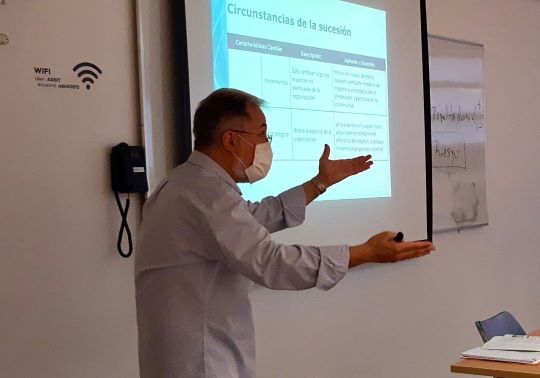
Last Monday, July 5, the tenth session of the Family Business Course: Key aspects for its competitiveness and durability (13th Edition) was taught by Tomás González. Professor of Business Organization of the UV.
Tomás González, led a session focused on the succession planning of the Family Business, and began by highlighting two distinctive characteristics of the Family Business, on the one hand, the orientation to the continuity of the family-business bond, and on the other, the need to manage the cohesion and awareness of the group of belonging and avoid the destructive power of emotions.
The succession from one generation to another is a process with enormous difficulties because to the problems of the change of leadership that all companies have, the emotional and psychological problems related to the family are added, and all of them must be reconciled simultaneously.
Professor González, stressed the importance of the preparation of the company and the family for different scenarios that may appear, since these scenarios will provoke different reactions that give rise to conflicts. Thus, 85% of the problems stem from the lack of common interests and problems of family harmony.
He then explained the types of succession, their management advantages:
- Depth. Incremental, smooth transition, where the successor shares business models and strategies with the predecessor and thus ensures continuity; strategic, either because the successor has a completely different view of the business, or because the environment demands big changes.
- Attitude. Proactive, design of an institutional structure and a plan to deal with the succession; reactive, no structure and no plan specified.
- Need. Timely, management, potential family successors or other stakeholders believe that the circumstances are present and the appropriate time has come; Fundamentally, the manager/owners are suddenly forced to leave their position immediately.
- Velocity. Slow, generally considered safer (legitimacy, coexistence of successor – incumbent); fast, not necessarily bad, to the extent that there is institutional support.
The second part of the day was in charge of Raúl Aznar, Partner – Director of Aznar Patrimonio, who directed one focused on the financing of the Family Business.
Raul began the session by explaining the economic flows between the company and the family (dividends, wages, capital, loans and untributed profits) the health of company - family depends, among other issues, on an adequate balance between the finances of the company and the family.
He then explained the financial needs and objectives of the company and the family:
- Financial needs: Cover current expenses, including financial expenses, meet extraordinary expenses (contingencies), undertake investments, generate returns for shareholders and through the growth of value or the distribution of dividends.
- Financial objectives: to grow in value (capitalization) or generate recurring profits, own resources (capital) or foreign resources (debt), time horizon, that is, one's own life or road generations and tolerance to anxiety
The alignment of financial needs and objectives is fundamental for the survival of the family business.
Raul also told the value of the Family Office, it is a way of organizing the heritage that involves the planning of the transfer of the legacy and the professionalization of investment and management. It requires providing the estate with a structure dedicated exclusively to making investment decisions and their subsequent management, as well as criteria (a plan) to avoid randomness or personalism. It provides the family with:
- A decision-making body (governance) and a body responsible for its implementation.
- A plan to carry out.
- Objectives and goals that clarify the path for present and future generations.
- Resources earmarked for the achievement of the established goals.








